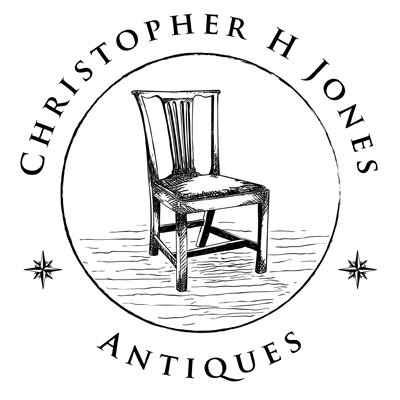Apothecary Cabinet or Physics Chest
Mahogany Case with Brass Fittings – Probably English
Fully Equipped with Multiple Drug Jars, Scales, Lancet, Blades, Mortar & Pestle,
and Various Medical Instruments of American and English Origin
Probably owned by Dr. Grafton Taylor, (1811-1884) Georgetown, District of Columbia
Circa 1830
This apothecary cabinet with its drug jars and equipment provides graphic evidence of the limited resources available to physicians in the early nineteenth century. This portable kit provided access to the full range of animal, vegetable and mineral substances that were the ingredients for common medications. These substances were bottled in powdered or granulated forms and prepared by the physician and administered to the patient. The apothecary cabinet included the case for storage and travel as well as the equipment needed to prepare the drugs such as mortar and pestle, large and small scales, tweezers, measuring vials, shot glasses and spatula. In rural areas apothecaries were sometimes owned by laymen or women who took the responsibility for medical care for their families and in the south, their slaves.
The drug jars in this apothecary bear the labels of several different Georgetown shops including John L. Kidwell at High and Prospect Streets, T.A. Ritchie, Forest Hall, Ritchie and Causten, Forest Hall, O.M.Linthieum, and Laurence & Love at the corner of High and Prospect Streets. The name of “Dr. Tyler” appears on the Kidwell label indicating that the drug was prepared for the apothecary of Dr. Grafton Tyler who was a prominent Georgetown physician practicing there for over forty years. According to his biography in the Centennial History of Washington, Grafton Tyler graduated from the University of Maryland in 1833 and settled into a general family practice. He established himself in Georgetown in 1843 where he was physician to Georgetown College and taught at the Columbian University. He and his wife Mary Bowie Tyler resided at 1300 30th Street where he held office hours. “He was a member of all the medical societies and associations of Washington, and was consulting physician to Providence Hospital and president of its medical board from its opening in 1863. He also contributed largely to the medical literature of his day.” The high opinion of Tyler held by the authors of the Centennial History was not shared by all of the doctor’s contemporaries. In his “Personal Reminiscences and Recollections” (1895) Dr. Samuel Busey recalled that while Tyler was “a man of attractive presence and manner, of undoubted ability and superior qualifications, [who] took great pleasure in exhibiting his forensic power…but never attained the eminence to which his capacity entitled him…He was singularly characterized by the habit of magnifying the gravity of cases of sicknesss and exaggerating his experience , so that it became a by-word with some physicians and the subject of discourteous comment by laymen.
The apothecary cabinet and its contents survive in outstanding condition and offer a virtually complete example of the state of the art of this medical essential in nineteenth century America.
Price: sold


